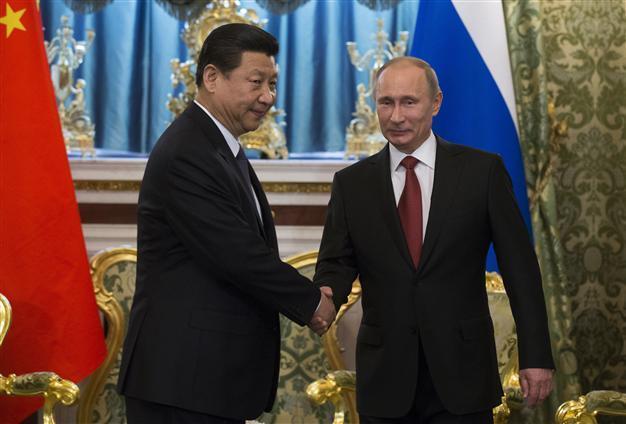China's Xi, Putin eye energy, investment deals
MOSCOW - Agence France-Presse

Russian President Vladimir Putin, right, and Chinese President Xi Jinping shake hands during their meeting in the Kremlin in Moscow, Russia, Friday, March 22, 2013. AP Photo
China's new leader Xi Jinping, on his first foreign trip as president, held talks with Russian host Vladimir Putin on Friday which focused on a raft of energy and investment accords. A key deal expected to be signed between the two nations will see Russia ramp up oil supplies to China, which is the world's biggest energy consumer."We are grateful for your decision to make your first foreign trip to our country," Putin said at the start of the Kremlin talks.
"Russian-Chinese ties are an important factor of international politics." Xi, who arrived in Russia accompanied by first lady Peng Liyuan, said he was eager to boost "strategic cooperation" with Putin, stressing his personal rapport with the Russian strongman.
"We always treat each other with an open heart," said Xi, who will travel to Africa after his Moscow talks.
"We are good friends," said Xi, who will preside over the world's second-largest economy for the next 10 years.
Putin and Xi first met in 2010 when the Chinese leader, then vice-president, travelled to Moscow for talks.
Earlier in the day Russian Deputy Prime Minister Dmitry Rogozin and his Chinese counterpart Wang Yang oversaw the signing of a number of deals.
These agreements included a $2 billion (1.5 billion euro) deal involving Russian energy firm En+ Group and China's largest coal company Shenhua Group to develop coal resources in Russia's Far East.
Experts say the two leaders will use the symbolic visit to try and map out a cooperation plan for the next 10 years.
"Essentially we are talking about a new epoch in relations between Russia and China," said Sergei Sanakoyev, a veteran China expert with links to the Russian government.
Once bitter foes during the Cold War, Moscow and Beijing have over the past years ramped up cooperation as both are driven by a desire to counterbalance US global dominance.
At the UN Security Council, China and Russia have both vetoed resolutions to impose sanctions on Syrian President Bashar al-Assad's regime, which is locked in a two-year conflict with the opposition.
Both Syria and North Korea are set to be high on the day's agenda. But the economy is expected to be at the forefront of the talks between Russia, the world's largest energy producer, and China, the world's largest energy consumer.
Russia, which wants to diversify its energy markets away from Europe, needs to finalise a potentially huge gas deal which could eventually see almost 70 billion cubic metres of gas pumped to China annually for the next 30 years.
The Russian state's natural gas giant Gazprom is likely to sign an agreement although not a firm contract, said company spokesman Sergei Kupriyanov.
The commercial contract has so far proved elusive as talks have become mired in pricing disputes.
Russia's biggest oil company Rosneft is expected to sign an agreement to boost supplies to China from the current 15 million tonnes a year. A Rosneft spokeswoman declined to comment but Rosneft chief Igor Sechin indicated that the firm could increase supplies to China to 50 million tonnes a year.
"China is a strategic market for Rosneft," he told Russian media. "The goal of 50 million (tonnes a year) is not something that's unattainable." Sanakoyev, general secretary of the Russia-China Chamber for Promotion of Trade in Machinery and Innovative Products, said the two countries will also sign a preliminary agreement allowing Chinese companies to help develop Russia's remote Far East. Xi's first overseas trip will then take him to Africa to shore up his resource-hungry country's soaring influence on the continent with visits to Tanzania, South Africa and the Democratic Republic of Congo.
Russia and China are members of the BRICS grouping of emerging economies, which includes Brazil, India and South Africa and which will hold a summit in South Africa next week attended by both Putin and Xi.
















